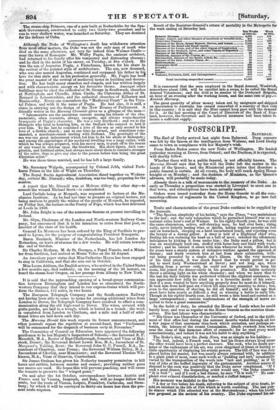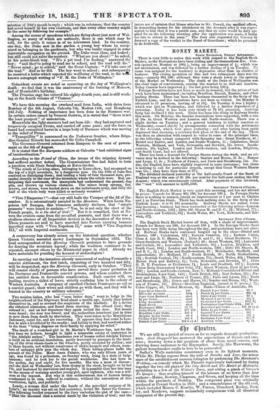Traits and characteristics of the great Duke continue to be
supplied by the journals.
"The Spartan simplicity of his habits," says the Times, "was maintained to the last ; and the only relaxation which he permitted himself was an oc- casional extra hour's rest at Weimer. In his eighty-fourth year, he was still the same abstemious, active, self-denying man, he had ever been ; rising early, never latterly tasting wine or spirits, tiling regular exercise on foot and on horseback, sleeping on a hard uncurtained couch, and rejecting even the luxuz7 of a downy pillow. A story is told of a Highland chief who, finding his son reclining his head on a ball of snow, rebuked the effeminate indulgence by kicking it from under him : the Duke used a pillow, but it was an exceedingly hard one, stuffed with horse-hair and lined with wash- leather ; and he carried it about with him wherever he went. His life had for years been a steady system of defensive warfare against the approach of disease ; and death overtook him at last from sheer exhaustion, with- out being preceded by a single day's illness. On the very morning of his fatal attack, it was much feared that he would persist in go- ing to meet Lady Westmoreland at Dover ; and not long ago, when suffering from a severe cold, he could not be persuaded to keep his room, but joined the dinner-circle in his greatcoat. His habits certainly throw a striking light on his whole character ; and when we learn that to the last his daily toilette was performed without the slightest assistance, we can appreciate how fully he acted Up to a favourite motto of his own— that if a man wanted to have anything properly done he must do it himself. It took him from half-past six o'clock WI nine every morning to dress ; but, even to the operation of shaving, he did all himself; and at his age that must have been nearly as difficult a feat as winning a battle in early life. Though in his eighty-fourth year, he still wrote a firm hand and carried on a large correspondence ; curious confirmations of the strength of nerve re- quired to form a great commander."
In the habit of duty, he attended the House of Lords when he could barely hear, and was as regular at the Horse Guards as the sentries them- selves. His last labour was characteristic-
" His Grace was Chancellor of the University of Oxford, and in the fulfil- ment of that office had during the summer months waded through all but a few pages of that enormous blue-book which embodies, and perhaps en- tombs, the labours of the recent Commission. Death overtook him when near the close of this immense effort of research ; for he read every word conscientiously, and indeed it was not his habit to skip anything."
The Duke's diet, says the Daily Hews, was as simple as his habits— "Re had, indeed, a French cook, but had his Grace always lived alone the office would have been a perfect sinecure. The cook, who no doubt par- takes of the enthusiasm of his art, was even chagrined at times at having so little opportunity of displaying his artistic powers. The bill of fare was duly placed before his master, but was nearly always returned with, in addition to a plain joint of meat, some such words as 'pudding and tart,' occasionally varied by the transposition of the words into 'tart and pudding,' as if by way of joke at the baffled ingenuity of the gastronomist. Another source of disquiet to the cook was positively that the Duke never complained. If I cook a good dinner,' the desponding artist would say, the Duke remarks, "it is well " ; and if I cook a bad dinner, he says " It is well."' No com- plaint ever evinced dissatisfaction, or marked a ruffled temper."
His memory was faithful to the last.—
" A day or two before his death, referring to the subject of civic feasts, he told an incident in the life of Pitt which is worth recording. The last pub lie dinner which Pitt attended was at the Mansionhouse ; when his health was proposed .as the saviour of his country. The Duke expressed his ad-
miration of Pitt's speech in reply ; which was in substance, that the country had saved herself by her own exertions, and that every other country might do the same by following her example."
Among the scores of anecdotes which are flying about just now of Wel- lington, so many of which are untimely, there is one which may be told, for the smile it raises is of no irreverent kind. In the country, one day, the Duke saw in the garden a young boy whom he recog- nized as belonging to the gardeners, but who was busily engaged in some inscrutable occupation on the ground. The Duke went close, and looked ; but still could not solve the mystery. "What are you about ? " he asked, in his point-blank way. "It's a pet toad I'm feeding," answered the boy ; "and they're going to send me to school, and the toad will die." "Never mind ; go to school," said the Great Captain : "Fll take care of the toad." And so he did. The boy went to school ; and subsequently he received a letter which reported the wellbeing of the toad, in the wet- known autograph writing of "F. M. the Duke of Wellington."
Coincident events are noted as occurring on the day of Wellington's death : we find that it was the anniversary of the burning of Moscow, and of Humboldt's birthday.
The Prussian sage has entered his eighty-fourth year, and is still work- ing at the fourth volume of "Cosmos."



























 Previous page
Previous page